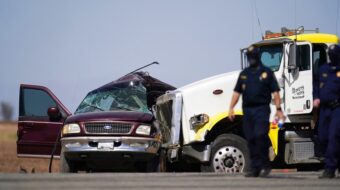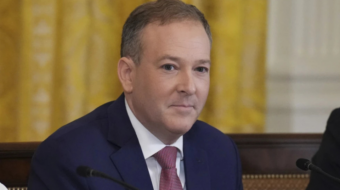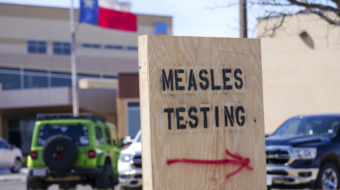
WASHINGTON—The nation’s railroads, flush with cash while cutting workers and letting safety hazards increase, spent $165 billion since 2015 in buying back their own stock, to benefit Wall Street financiers who back them, the head of the AFL-CIO’s Transportation Trades Department says.
So as part of a multi-pronged effort to force the carriers to invest in safety rather than securities purchases, TTD’s unions and rail workers launched a “no stock buybacks until safety improves” campaign, department President Greg Regan adds.
“They’re focused on returning as much money as they can to Wall Street shareholders and executives,” Regan declares about the freight railroads.
www.NoStockBuybacks.org aims to ratchet up public pressure against that rail priority.
Regan explains that when the coronavirus pandemic hit, throwing the nation into a Depression and shutting half of all businesses and commerce, “there were no (federal) requirements for the freight railroads to meet” or earmarked subsidies to receive from the federal government to survive. That’s unlike what the airlines won when the Depression tanked them all and slashed rail traffic.
The difference, Regan said in an exclusive telephone interview, was that Association of Flight Attendants-CWA President Sara Nelson convinced House Transportation Committee Chairman Peter DeFazio, a fellow Oregonian, to condition the airlines’ $25 billion subsidy on at least three provisos: Keep flying, keep all their workers and no stock buybacks.
The airline conditions have since lapsed, and TTD’s five airline unions launched a “no buybacks” campaign last August, saying those carriers need to modernize first—a point emphasized by Southwest’s massive holiday meltdown due to 50-year-old computer systems.
There are no such strings attached to the freight railroads, then or now, Regan adds.
“Service has gotten worse, energy levels” among workers “has gotten worse. And lack of investment” in safety measures, equipment, and workers “has gotten horrible, so the shippers have been complaining to the Surface Transportation Board,” which oversees the rail freight firms, he said.
The board, headed by former Chicago City Councilman Martin Obermann—who knows something about freight railroads due to Chicago’s position as the nation’s rail freight hub—appears sympathetic. But it’s outgunned, Regan says. The board must handle safety, staffing, and mergers, too. That includes a recent and contentious one between the Kansas City Southern and the Canadian Pacific. The board OKd the merger in mid-March.
That’s where TTD’s anti-stock buyback drive comes into the picture, by ratcheting up public pressure on both the board and Congress to solve the problem by forcing the freight rail firms to invest in workers and in safety, since they won’t do it—or enough of it—themselves.
Rail profits totaled $146 billion since 2015, augmented by the carriers’ imposition of Precision Scheduled Railroading (PSR). That business plan emphasizes massive cuts in personnel—30% since 2015—and forcing remaining workers to perform safety inspections for which they lack training.
It also features crew scheduling that leaves the workers sleepless, often working two or three weeks consecutively, and unable to even keep doctors’ appointments, among other ills. And it means no paid sick days in the congressionally imposed contract last November. Some carriers have since negotiated individual paid sick day provisions with the 14 rail unions.
And PSR means cutting track inspectors in favor of remote computer-controlled inspection, slowness or outright refusal to upgrade safety systems, and putting hazardous, chemical-laden tank cars at the rear of ever-longer freight trains so their contents could be delivered first.
It also means railroads continue to campaign for just one worker, the engineer, on freights. Rail unions and workers, notably in the rank-and-file Railroad Workers United, demand a minimum of two.
All this had little impact on the freight railroads until the Feb. 3 rail wreck, fire, and release of hazardous chemicals from Norfolk Southern #32 in East Palestine, Ohio.
Then the country woke up to the hazards of long freight trains and what could happen to people in the surrounding area if they crashed—especially if that area was the nation’s rail hub, Chicago, or other large cities, such as the Twin Cities. Chicago hosts 1,300 freight trains a day.
A 100-car train wrecked in Raymond, Minn., 100 miles west of Minneapolis, a month ago, and 22 derailed. Four derailed tank cars of ethanol caught fire. Nearby residents were briefly evacuated.
The federal response has been Surface Transportation Board hearings and probes, shipper screams about bad service and safety problems, lobbying for tougher safety standards by TTD, its 14 rail unions, and the rank-and-file Railway Workers United, and an Environmental Protection Agency order to Norfolk Southern to clean up the East Palestine mess at its expense.
But when NS detailed 39 members of the Brotherhood of Maintenance of Way/Teamsters to do so, they got sick. They complained to supervisors of migraine headaches and nausea. NS turned a deaf ear, so the men took their problems to the Teamsters, who raised hell with Ohio officials.
It’s also led to proposed legislation bringing much of PSR to a screeching halt, by mandating more safety measures, including human inspections and two-person crews—not the sole crew member, the engineer, which the carriers demand.
And it’s led to the TTD’s anti-buyback campaign.
Regan’s campaigning among lawmakers to adopt the regulatory measure, which has bipartisan backing from Sens. Sherrod Brown, D-Ohio, and J.D. Vance, R-Ohio, plus both Pennsylvania Democrats. “Our ultimate goal is a safer, happier, and better rail workforce. If we get better legislation, they’ll be forced to meet it” he says of the profitable freight firms.
“They’ll have to hire more people and invest in their rail systems first” not in satisfying their financial backers. “They’ll have to move.
“This is an important campaign tying everything together,” including the profits, the buybacks, and the safety problems. “Otherwise, they’ll go back to being a sleeping giant,” he says of the freight railroads—and a hugely profitable one for their capitalist backers.
“But between East Palestine, sick leave” and the buybacks and profits, “people are seeing how these railroads operate.”
We hope you appreciated this article. Before you go, please support great working-class and pro-people journalism by donating to People’s World.
We are not neutral. Our mission is to be a voice for truth, democracy, the environment, and socialism. We believe in people before profits. So, we take sides. Yours!
We are part of the pro-democracy media contesting the vast right-wing media propaganda ecosystem brainwashing tens of millions and putting democracy at risk.
Our journalism is free of corporate influence and paywalls because we are totally reader supported. At People’s World, we believe news and information should be free and accessible to all.
But we need your help. It takes money—a lot of it—to produce and cover unique stories you see in our pages. Only you, our readers and supporters, make this possible. If you enjoy reading People’s World and the stories we bring you, support our work by donating or becoming a monthly sustainer today.










